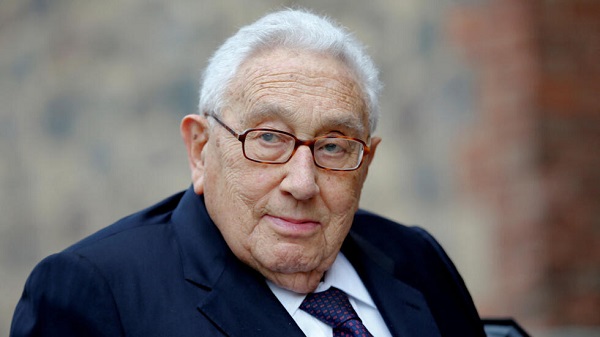Henry Kissinger, the iconic American diplomat, has passed away at the age of 100
Henry Kissinger, the renowned former US secretary of state known for his unapologetic advocacy of American power in shaping the post-World War II global landscape, passed away on Wednesday at the age of 100, according to his consulting firm, Kissinger Associates.
The firm released a statement late on Wednesday, stating, “Dr. Henry Kissinger, a respected American scholar and statesman, died today at his home in Connecticut.” Kissinger’s impact on international relations and his role in shaping key diplomatic strategies make his passing a significant moment in the history of American foreign policy.
The family of Henry Kissinger has announced plans for a private funeral, with a memorial service scheduled to occur later in New York. The statement did not disclose the cause of his death.
Despite reaching the age of 100, Kissinger maintained an active lifestyle, demonstrating his enduring engagement with global affairs.
As recently as July, he traveled to China for a meeting with President Xi Jinping, underscoring his ongoing commitment to diplomatic involvement even in his centenarian years. His legacy as a statesman and scholar continues to leave a lasting impact on the world of international relations.
One of Henry Kissinger’s enduring legacies is his transformative role in reshaping diplomatic relations with China. Seeking to alter the dynamics of the Cold War confrontation with the Soviet Union, Kissinger initiated clandestine communications with China, leading to the landmark visit by President Richard Nixon in 1972.
This historic event paved the way for the establishment of formal diplomatic relations between the United States and Beijing. Kissinger’s strategic vision and diplomatic efforts significantly influenced the geopolitical landscape, contributing to a shift in global alliances and the opening of a new chapter in Sino-American relations.
Following the fallout of the Watergate scandal that led to Richard Nixon’s resignation, Henry Kissinger continued his role in government under Nixon’s successor, Gerald Ford. In an extraordinary arrangement, Kissinger concurrently held positions as both Secretary of State and National Security Advisor.
His notable contributions include being awarded the Nobel Peace Prize for his involvement in negotiations aimed at ending the Vietnam War. It’s worth noting that despite Kissinger’s efforts, the conflict persisted beyond the negotiations, and his North Vietnamese counterpart, Le Duc Tho, opted not to accept the prize.
This period reflects the complexity of Kissinger’s diplomatic legacy, marked by both accolades and ongoing challenges in international affairs.
Despite the begrudging acknowledgment of Henry Kissinger’s intellectual prowess, he remains a deeply controversial figure due to his adherence to the philosophy of realpolitik—a pragmatic approach emphasizing the cold calculation of national interests through power.
Declassified documents have unveiled Kissinger’s involvement in endorsing the destabilization of Chile’s democratically elected Marxist president, Salvador Allende, and subsequently, his approval of the 1973 coup led by General Augusto Pinochet.
These revelations underscore the contentious aspects of Kissinger’s legacy, as his actions in support of realpolitik were often criticized for their ruthlessness and disregard for democratic principles. The Chilean episode exemplifies the ethical challenges associated with his approach to international relations.
Kissinger demonstrated support for Indonesia, a staunch anti-communist ally, during its annexation of East Timor in 1975. Additionally, he overlooked Pakistan’s widespread atrocities during Bangladesh’s struggle for independence in 1971, viewing Islamabad as a crucial intermediary in fostering relations with China.
These instances further highlight Kissinger’s realpolitik approach, where strategic interests often took precedence over ethical considerations, contributing to the controversial nature of his diplomatic legacy.
